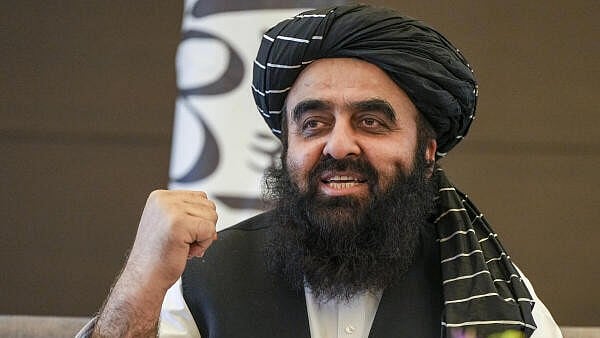
Amir Khan Muttaqi
Credit: PTI Photo
New Delhi: Afghanistan will unitedly and steadfastly resist any aggression by Pakistan and resolutely protect its sovereignty, the foreign minister of the Taliban regime in Kabul, Amir Khan Muttaqi, told journalists in New Delhi on Sunday, after a cross-border military flare-up escalated tension across the Durand Line, his country’s border with neighbouring Pakistan.
“The policy of the Islamic Emirate of Afghanistan is to resolve all problems through discussion and understanding. We want to have zero tension, and, if they do not want that, then Afghanistan has other means,” Muttaqi said, sending out a stern warning to Pakistan from India.
The foreign minister of Taliban-ruled Afghanistan has been on a visit to India since Thursday. He held his second news conference in New Delhi.
His first news conference in New Delhi on Friday had triggered a controversy as only male journalists had been invited. The woman journalists, however, had been invited to the second news conference he had in New Delhi.
“The policy of the Islamic Emirate of Afghanistan is to resolve all problems through discussion and understanding. We want to have zero tension, and if they don't want that, then Afghanistan has other means," Muttaqi said, referring to the Pakistan-Afghanistan conflict, adding: Afghanistan has no problem with people and politicians of Pakistan but added that certain elements in that country are trying to vitiate the environment.”
Islamabad has been accusing the Taliban regime in Afghanistan of giving shelter to Tehreek-i-Taliban Pakistan (TTP) terrorists, blaming the group for a series of attacks in Pakistan.
Kabul has rejected the allegation of Islamabad.
Muttaqi came to India after the United Nations Security Council granted him a limited-period exemption from the travel ban that was imposed, along with asset freeze and arms embargo, on him and the other leaders of the Taliban. He is the first Afghan Taliban leader to be publicly hosted by India. His meeting with External Affairs Minister S Jaishankar was India’s highest-level engagement with the Taliban in 25 years. The last one had taken place in December 1999, when the then external affairs minister, Jaswant Singh, had a meeting with the Taliban government’s foreign minister, Wakil Ahmed Muttawakil, in Kandahar and handed over to him three terrorists, including Jaish-e-Mohammad chief Masood Azhar, to secure the release of the crew and the passengers of the hijacked Indian Airlines flight IC-814, which had been hijacked by the terrorists linked to Pakistan.
Islamabad reacted to the latest engagement between the Taliban government in Kabul and New Delhi, by carrying out aerial attacks on Kabul as well as on a market in Afghanistan’s Paktika province near its border with Pakistan.
“Afghanistan will maintain the security of its territory and airspace. There have been violations, and we have given immediate responses to them. In the night, there were retaliatory operations in which we achieved our objectives,” said Muttaqi. "If some people don't want to resolve this episode, Afghanistan has the capacity to protect its territory and airspace. The people and forces of Afghanistan are united to defend the country.
"Afghanistan has another great speciality that even if we have internal differences, when the issue of external interference comes up, then all the Afghan people, government and clerics get united to confront it and defend the country,” he said.
Though New Delhi, like the majority of the international community, did not formally recognise the Taliban government in Afghanistan, it has been stepping up its engagement with the regime in Kabul, in order to deny Pakistan and China a strategic advantage against India.
He said several friendly countries, including Qatar and Saudi Arabia, had reached out to the Taliban government in Kabul and urged that the conflict between Afghanistan and Pakistan should stop.
"From our side, we have stopped the fighting, and the situation is under control. We want good relations. Our doors for talks are open. We brought peace to Afghanistan. We want peace in the entire region," he said.
